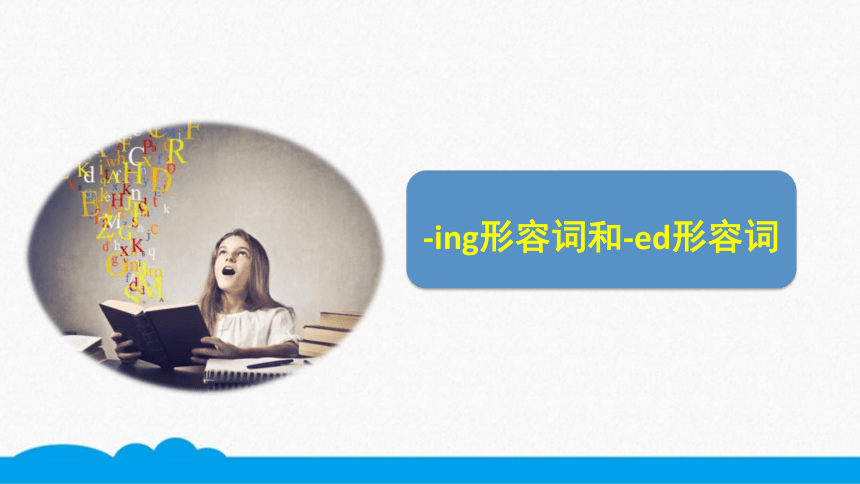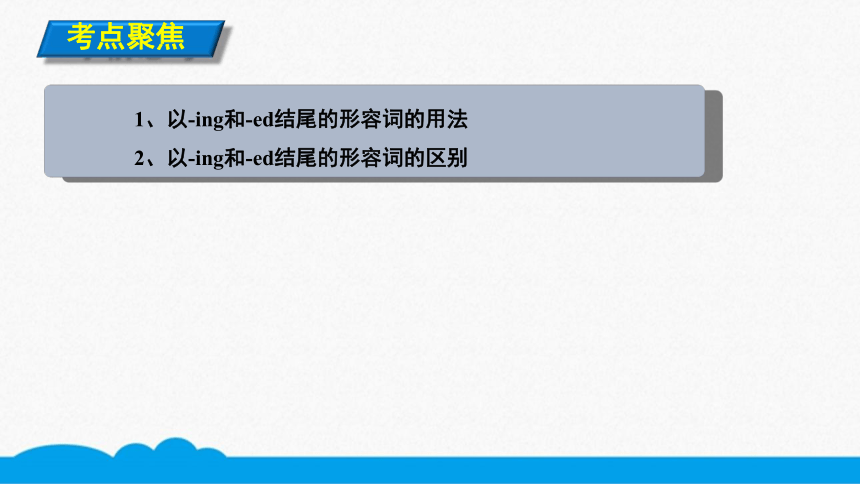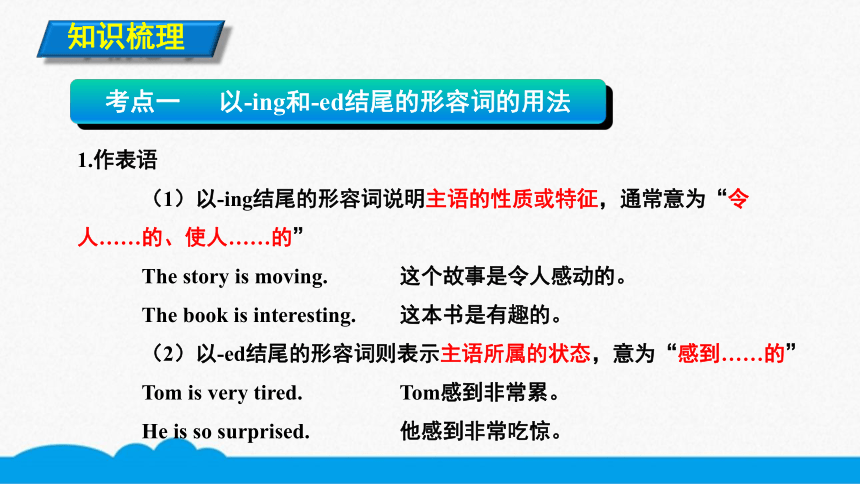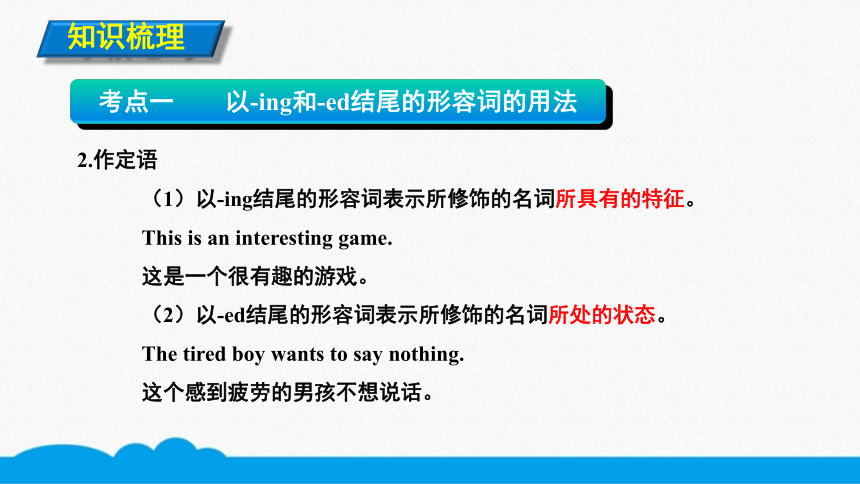初英知识点微课课件考点精讲 63 ing形容词和ed形容词
文档属性
| 名称 | 初英知识点微课课件考点精讲 63 ing形容词和ed形容词 |

|
|
| 格式 | pptx | ||
| 文件大小 | 650.7KB | ||
| 资源类型 | 试卷 | ||
| 版本资源 | 通用版 | ||
| 科目 | 英语 | ||
| 更新时间 | 2021-07-14 00:00:00 | ||
图片预览




文档简介
-ing形容词和-ed形容词
考点聚焦
1、以-ing和-ed结尾的形容词的用法
2、以-ing和-ed结尾的形容词的区别
考点一 以-ing和-ed结尾的形容词的用法
知识梳理
1.作表语
(1)以-ing结尾的形容词说明主语的性质或特征,通常意为“令人……的、使人……的”
The story is moving. 这个故事是令人感动的。
The book is interesting. 这本书是有趣的。
(2)以-ed结尾的形容词则表示主语所属的状态,意为“感到……的”
Tom is very tired. Tom感到非常累。
He is so surprised. 他感到非常吃惊。
考点一 以-ing和-ed结尾的形容词的用法
知识梳理
2.作定语
(1)以-ing结尾的形容词表示所修饰的名词所具有的特征。
This is an interesting game.
这是一个很有趣的游戏。
(2)以-ed结尾的形容词表示所修饰的名词所处的状态。
The tired boy wants to say nothing.
这个感到疲劳的男孩不想说话。
考点二 以-ing和-ed结尾的形容词的区别
知识梳理
(1)以-ing结尾的形容词主要用于说明事物,表示事物的性质或特征,若用于说明人,则表示此人具有此性质或特征。
a frightening look
(2)以-ed结尾的形容词(如ashamed,excited等等)通常用于说明人,不用于说明事物;即使它们所修饰的名词是事物,那他们指的也是与该事物相关的人。
He told me the news in a very excited voice.
典例剖析
Harry Porter is an ___ book for children, but my cousin isn’t ___ in it.
A. interesting; interesting
B. interested; interested
C. interesting; interested
D. interested; interesting
中考链接
Chinese people were very____ when Liu Xiang broke the world record(记录). What ____ news it was!
A.excited; excited
B.exciting; exciting
C.exciting; excited
D.excited; exciting
思维导图
–ing形容词:(物)令人……
-ed形容词:(人)感到,觉得……
–ing形容词和-ed形容词
元申小课 必有收获
考点聚焦
1、以-ing和-ed结尾的形容词的用法
2、以-ing和-ed结尾的形容词的区别
考点一 以-ing和-ed结尾的形容词的用法
知识梳理
1.作表语
(1)以-ing结尾的形容词说明主语的性质或特征,通常意为“令人……的、使人……的”
The story is moving. 这个故事是令人感动的。
The book is interesting. 这本书是有趣的。
(2)以-ed结尾的形容词则表示主语所属的状态,意为“感到……的”
Tom is very tired. Tom感到非常累。
He is so surprised. 他感到非常吃惊。
考点一 以-ing和-ed结尾的形容词的用法
知识梳理
2.作定语
(1)以-ing结尾的形容词表示所修饰的名词所具有的特征。
This is an interesting game.
这是一个很有趣的游戏。
(2)以-ed结尾的形容词表示所修饰的名词所处的状态。
The tired boy wants to say nothing.
这个感到疲劳的男孩不想说话。
考点二 以-ing和-ed结尾的形容词的区别
知识梳理
(1)以-ing结尾的形容词主要用于说明事物,表示事物的性质或特征,若用于说明人,则表示此人具有此性质或特征。
a frightening look
(2)以-ed结尾的形容词(如ashamed,excited等等)通常用于说明人,不用于说明事物;即使它们所修饰的名词是事物,那他们指的也是与该事物相关的人。
He told me the news in a very excited voice.
典例剖析
Harry Porter is an ___ book for children, but my cousin isn’t ___ in it.
A. interesting; interesting
B. interested; interested
C. interesting; interested
D. interested; interesting
中考链接
Chinese people were very____ when Liu Xiang broke the world record(记录). What ____ news it was!
A.excited; excited
B.exciting; exciting
C.exciting; excited
D.excited; exciting
思维导图
–ing形容词:(物)令人……
-ed形容词:(人)感到,觉得……
–ing形容词和-ed形容词
元申小课 必有收获
同课章节目录
- 词法
- 名词
- 动词和动词短语
- 动词语态
- 动词时态
- 助动词和情态动词
- 非谓语动词
- 冠词
- 代词
- 数词和量词
- 形容词副词及其比较等级
- 介词和介词短语
- 连词和感叹词
- 构词法
- 相似、相近词比较
- 句法
- 陈述句
- 一般疑问句和否定疑问句
- 特殊疑问句及选择疑问句
- 反意疑问句
- 存在句(There be句型)
- 宾语从句
- 定语从句
- 状语从句
- 主谓一致问题
- 简单句
- 并列句
- 复合句
- 主谓一致
- 主、表语从句
- 名词性从句
- 直接引语和间接引语
- 虚拟语气
- 感叹句
- 强调句
- 倒装句
- 祈使句
- 句子的成分
- 句子的分类
- 题型专区
- 单项选择部分
- 易错题
- 完形填空
- 阅读理解
- 词汇练习
- 听说训练
- 句型转换
- 补全对话
- 短文改错
- 翻译
- 书面表达
- 任务型阅读
- 语法填空
- 其他资料
